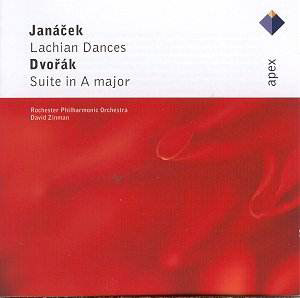David Zinman is an admirable conductor who has built
up a distinguished discography over the
years, conducting orchestras on either side of the Atlantic. This Apex
issue finds him with the Rochester Philharmonic, who play extremely
well for him in these two pieces by Janáček and Dvořák.
The recorded sound is not
spectacular but it is eminently appropriate and reliable. There is a
good sense of perspective and details come through the texture to enliven
the musical experience. This is particularly important in Janáček's
early Lachian Dances, which for the most part make him
sound like a 19th century composer, which he was of course when he wrote
them, rather than the 20th century composer his major works show him
to be. For we should always remember that he was 46 years old when the
new century began.
The Lachian Dances are in the same mould as
Dvořák's wonderful Slavonic
Dances, and they do not suffer from the comparison. Zinman gives
the rhythms a lilting quality, and the orchestra plays with character,
giving these genuine folk tunes a spontaneous flow. If anything it is
the slower music which is most pleasing of all, thanks to the beguiling
phrasing and the attractive melodic contours.
Dvořák's Suite is
one of the less famous of his American compositions, but that does not
mean that the music is inferior. During the 1890s the composer was at
the height of his powers and everything he touched turned to
gold. Originally composed for solo piano, it was later orchestrated
by the composer, although never performed in this version during his
lifetime. The first performance took place in Prague in March 1910,
some six years after his death.
The music has an immediate appeal, with typically fresh
melodies and lively rhythmic qualities. For all the American connections,
the idiom is characteristically Bohemian, and Zinman points the phrasing
admirably. With such winning performances, it is therefore the more
regrettable that the disc should contain only 47 minutes of music. It
is surprising that Apex did not consider this issue when planning the
release of this reissue.
Terry Barfoot


![]() See
what else is on offer
See
what else is on offer 